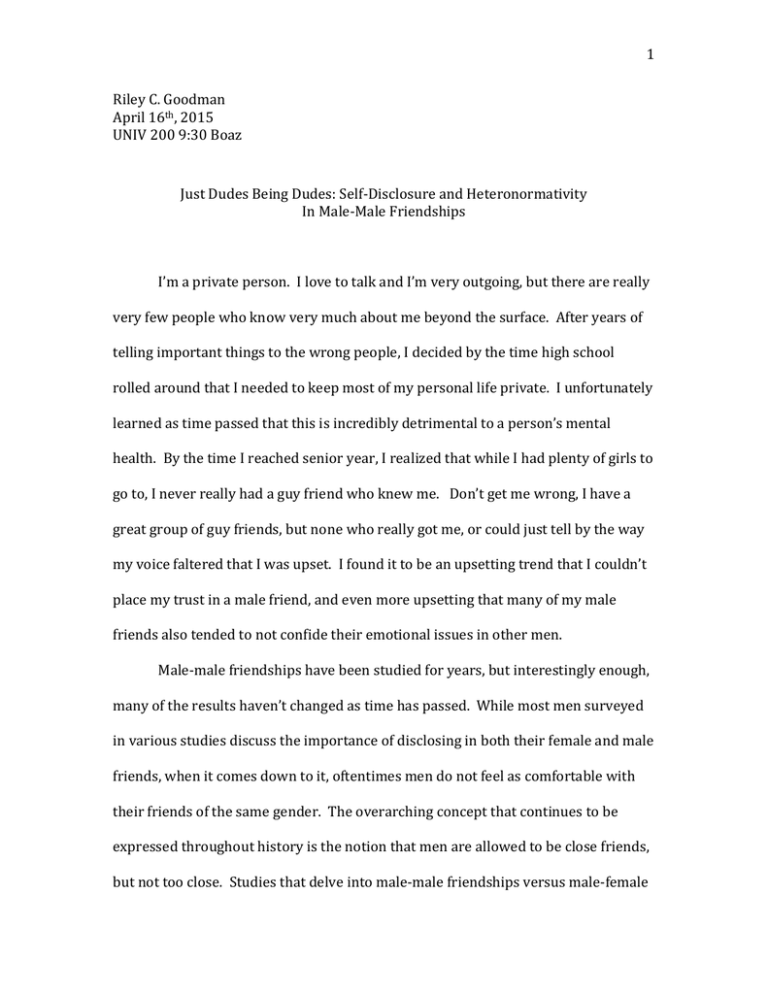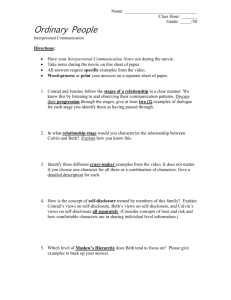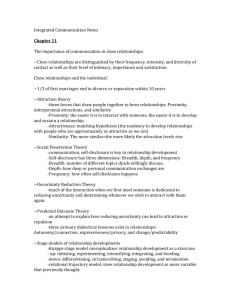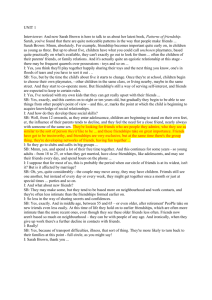Self-Disclosure and Heteronormativity In Male-Male
advertisement

1 Riley C. Goodman April 16th, 2015 UNIV 200 9:30 Boaz Just Dudes Being Dudes: Self-Disclosure and Heteronormativity In Male-Male Friendships I’m a private person. I love to talk and I’m very outgoing, but there are really very few people who know very much about me beyond the surface. After years of telling important things to the wrong people, I decided by the time high school rolled around that I needed to keep most of my personal life private. I unfortunately learned as time passed that this is incredibly detrimental to a person’s mental health. By the time I reached senior year, I realized that while I had plenty of girls to go to, I never really had a guy friend who knew me. Don’t get me wrong, I have a great group of guy friends, but none who really got me, or could just tell by the way my voice faltered that I was upset. I found it to be an upsetting trend that I couldn’t place my trust in a male friend, and even more upsetting that many of my male friends also tended to not confide their emotional issues in other men. Male-male friendships have been studied for years, but interestingly enough, many of the results haven’t changed as time has passed. While most men surveyed in various studies discuss the importance of disclosing in both their female and male friends, when it comes down to it, oftentimes men do not feel as comfortable with their friends of the same gender. The overarching concept that continues to be expressed throughout history is the notion that men are allowed to be close friends, but not too close. Studies that delve into male-male friendships versus male-female 2 friendships, and come to the conclusion of a lack of security between men, have just recently being conducted. Researchers assumed that male-male friendships weren’t much beyond the baseball diamond, and if relationships developed on any emotional level, it was an immediate sign of homosexuality in the two men. These were your boys through thick and thin, but it was generally frowned upon to connect on any sort of intimate or emotional level. The expectation that men remain in this removed relationship stems from a longitudinal history of enforced masculinity and a resulting, imposed heteronormativity. Understanding the ways in which imposed masculinity applies to today’s social policy is essential in grasping why male-male friendships that involve more emotional connection are taboo unless they qualify as homosexual relationships. From birth, Western culture employs systematic generalization of gender binary. Men and women alike must struggle to fulfill perceived roles of masculinity and femininity. For men this involves a world of blue, trucks, weapons and dirt. So what happens when men begin to tread into the self-proclaimed “acidic world of femininity”? The answer is simple, and we all know it no matter how much we pretend we don’t. When men stray for the societal ideals of masculinity they are looked down upon and become the source of ridicule. Society’s general homophobia spills over as jabs towards men who don’t possess the “proper” levels of masculinity. Although I acknowledge that being male doesn’t automatically mean a low level of self-disclosure, it can be claimed that lower levels of self-disclosure caused by socialized masculine expectations contribute to men’s inability to oftentimes form friendships that extend beyond the football field of life. 3 From a very early age, men are taught that in order to fulfill the masculine ideals of society, they must conduct themselves, and the relationships they develop in a certain fashion. A major part of the “act” that men perform is the development of friendship with other men. As Migliaccio states in “Men’s Friendships: Performances of Masculinity”, male-male friendship in most cases is nothing more than a performance of masculinity that is influenced by gendered expectations. And a major part of developing a friendship is the role of self-disclosure. Self-disclosure is the amount at which you are willing to disclose about yourself to family, friends etc. Many different factors contribute to self-disclosure between two people. These factors include geographic location and socioeconomic status. Various relationships tend to garner different levels of self-disclosure. Classically, one of the lowest levels of self-disclosure tends to occur between men, who often believe that their relation cannot and will not occur on an emotional level. Migliaccio furthers his research using a structural equation to analyze 98 men’s friendships, masculine expectations: one behavioral (stoic), the other attitudinal (anti-feminine) in attempts to see how they influence different forms of intimacy between friends. The study analyzed the relationship between these variables across two occupations, one male-traditional (military) and the other female-traditional (teacher). Conducting the study in this fashion further displays how friendship is part of a masculine performance because relationship between masculine expectations and interactions with friends are stronger for teachers than military personnel. Men tend to feel more at ease interacting with the more feminine occupations, further the perpetuation of the instilled heteronormativity. 4 Through this study, along with additional research it was discovered that a malemale friendship has the ability to be more emotional and less based on activity, but it is less common. Men are taught that lower levels of self-disclosure are the norm and therefore the relationships they develop with fellow men should proceed without the connection that many male-female friendships possess. Although this has seemingly become the national norm among the population, it doesn’t mean that emotional relationships are impossible between two men. Factors such as childhood development and expectations of a localized society play a major part in the kinds of relationships men build throughout their life. A period of constant adjustment and learning, childhood is the time at which we become individuals and begin to express our character both physically and emotionally. During the formative years of childhood, men and women are subconsciously (and overtly) taught what is expected of their imposed gender. Masculine character ideals include being tough, unforgiving and all around lacking in emotion. Men act this way because this is how their superiors teach them to act. However, before they slip into adulthood, boys possess the ability to create friendships comparable to two girls. As N. Way states in his study of adolescent boys, “listening to boys, particularly in their early and middle adolescent years, speak about their male friendships is like reading an old-fashioned romance novel in which the female protagonist describes her passionate feelings for a man. At the edge of manhood when pressures to conform to gender expectations intensify (Hill & Lynch, 1983), boys tell us, in great detail and with tremendous affect, about their best friends with whom they share their deepest secrets and without whom they 5 would ‘feel lost.'” However this doesn’t last forever. As boys age they are taught more and more not to cry, and to always remember to be strong, courageous and virtually emotionless. As expressed through the research in “Norms Affecting SelfDisclosure in Men and Women”, the blame for a lack of self-disclosure between male friends is placed closer to home via the idea of childhood development. The authors argue that men and women are raised differently and therefore forced to conform to different social norms. Women are classically taught to be more nurturing and emotional while, contrastingly, men are expected to be strong and virtually emotionless. Men grow up learning to be independent and selfsufficient. Friendship grows out of shared interests and are otherwise marginal to a man’s identity. The authors describe how this then affects men and women differently later in life. Men have difficulty establishing close relationships with other men because they aren’t taught/expected to act that way. The ends that the gender has set for itself hundreds of years ago give the “meaning” of a man’s life. As Kate Millett (197S) puts it, “Men repress, women express.” This notion of developmental factors as the main contributor to low levels of self-disclosure is furthered by the results of the study. These results show that the observed male was rated as being better adjusted when he failed to disclose than when he did disclose. The reverse trend occurred when a female was evaluated: She was seen as better adjusted when she disclosed than when she did not. The idea of a low level of self-disclosure doesn’t just a lack of communication within male-male friendships. This inherent self-sufficiency behavior has greater implications for the male psyche. Men are taught and learn to live without the support of others because they aren’t 6 supposed to have to rely on anyone else emotionally, romantically, or financially. V. Seidler, author of Rejection, Vulnerability, and Friendship goes on point out that most men do not let themselves think or feel about friendship. Men are taught to put away early childhood memories as childish things that they grow out of even though all typically secretly treasure their past. The general frayed nature of men’s relationships with each other and the way that they seem to be constantly undermined through competition and jealousy are distinctive features of modern society. Other explanations for men’s low level of self-disclosure extend far beyond childhood development. Often overlooked is the role of education and general socioeconomic status. Statistically speaking, lower educational and socioeconomic status tended to be associated with lower levels of verbal communication, in general and of self-disclosure, in particular. However unfortunately, higher socioeconomic classes seem to have a similar trend in a lack of communication. M. Komarovsky states in his study of Ivy League male undergrads that one “senior, who concealed from his girlfriend and sexual partner that he was in psychotherapy, found himself in a double bind. Soon after they had met, the young woman told him that she was in therapy. “I could not tell her,” the youth said, “that I too was in therapy. That would show her how unsure and confused I was. A girl wants a strong man. I would be lowering my image in her eyes.” This struggle of fitting the classic mold of masculinity could be viewed as a reflection of self, however deeper analysis suggests that this young man’s struggle is truly a reflection on his household and surrounding community. A localized society such as an Ivy League college town does not offer 7 the option for failure. The representation of perfection in the college education system is often seen through the students of the Ivy Leagues. Therefore, it is imperative that men fulfill the role that they are expected to play. There is no option to stray from the heteronormative ideals that come with manhood. In their eyes showing emotion or any sort of weakness is not an option because emotion equals femininity, and femininity assumes a man’s sexuality is anything other than straight. Alternative studies may suggest that a realization of self is enough for a man’s ego. If the proverbial man is comfortable in his sexuality then he should be able to establish relationships with other men without fear of ridicule for a misinterpretation of his romantic preference. However, as “Self-disclosure mediates the effects of gender orientation and homophobia on the relationship quality of male same-sex friendships” furthers, pre-instilled behaviors and men’s general fear of appearing anything other than straight is the key contributor behind why men express a lower level of self-disclosure in their relationships. Louis C.K. approaches the subject bluntly, stating: “We’re the only sexual group that gives a shit that we are not mistaken for anything else. Nobody else cares. I don’t know any women who are worried someone will think they’re a lesbian. I’ve never heard a gay guy say, ‘Everybody’s gonna think I’m straight.’ It just doesn’t happen. We’re the only ones that care. And it’s a drag for us, because—there’s a lot of things that we maybe could do, that might be nice, but we can’t, because someone will think we’re gay.” This statement references the way in which men oftentimes miss out on many aspects of life purely because of their fear of femininity. Men believe that straying from the 8 pre-set characteristics of masculinity will compromise their manhood. They will lose the say in their own sexuality and face constant backlash from their peers. The authors of “Self-disclosure mediates the effects of gender orientation and homophobia on the relationship quality of male same-sex friendships” go on to argue that not all men are afraid of developing close relationships but rather they just assume they can’t because of what society teaches them in general. Societal norms dictate that maintaining heterosexuality is more important than being able to create lasting friendships. Thus, being too close to other men isn’t allowed. In conclusion, although I acknowledge that being male doesn’t automatically mean a low level of self-disclosure, it can be claimed that lower levels of selfdisclosure caused by socialized masculine expectations contribute to men’s inability to oftentimes form friendships that involve any sort of emotional content. Factors like childhood development, (influenced by localized society and socioeconomic status) and a general homophobia among the male population create a toxic cocktail of low self-disclosure and an inability to form more established friendships. Unfortunately, if boys aren’t taught in the future that masculinity doesn’t have to be a ridged source of development, the general inability to form deeper friendships with other men will continue to transpire. 9 Works Cited: 1. Self-disclosure mediates the effects of gender orientation and homophobia on the relationship quality of male same-sex friendships Morman, Mark T ; Schrodt, Paul ; Tornes, Michael J Journal of Social and Personal Relationships, 2013, Vol.30(5), pp.582-605 2. Seidler, V. (1992). Rejection, Vulnerability, and Friendship. Men’s Friendships, 15-35. 3. Komarovsky, M. (1974). Patterns of Self-Disclosure of Male Undergraduates. Journal of Marriage and Family, Volume 36(No. 4), 677-686. 4. Just let them kiss already: Why are TV shows so weird about male relationships? (n.d.). Retrieved February 27, 2015, from http://www.salon.com/2015/02/24/just_let_them_kiss_already_why_are_tv _shows_so_weird_about_male_relationships 5. Way, N. (2012). Close Friendships Among Adolescent Boys. Thymos, 6(1), 116-136. 6. Migliaccio, T. (2009). Men’s friendships: Performances of masculinity. Journal of Men’s Studies, 17(3), 226-241. Retrieved from http://search.proquest.com/docview/222615180?accountid=14780






